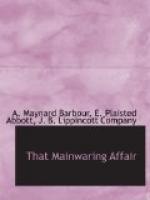Engaged in this work, he was seated at the large desk in the tower-room, which had that morning been opened for use for the first time since the death of its owner. He wrote rapidly, and the document was nearly completed when Mr. Whitney and Ralph Mainwaring together entered the adjoining room.
“Egad!” he heard the latter exclaim, angrily, “if that blasted scoundrel thinks he has any hold on me, or that he can keep me on the rack as he did Hugh, he’ll find he has made the biggest mistake of his life. It is nothing but a blackmailing scheme, and I’ve more than half a mind to sift the whole matter to the bottom and land that beggarly impostor where he belongs.”
“I hardly know just what to advise under the circumstances,” Mr. Whitney answered, quietly, “for I, naturally, have some personal feeling in this matter, and I am forced to believe, Mr. Mainwaring, that there is something back of all this which neither you nor I would care to have given publicity. But, laying aside that consideration, I am of the opinion that it might not be to your interest to push this matter too closely.”
“On what grounds, sir, do you base your opinion?” Mr. Mainwaring demanded.
The attorney’s reply, however, was lost upon Scott, whose attention had been suddenly arrested by the imprint of a peculiar signature across one corner of the blotter upon which he was drying his work, now completed. Instantly, oblivious to everything else, he carefully examined the blotter. It was a large one, fastened to the top of the desk, and had been in use but a comparatively short time. It bore traces both of Hugh Mainwaring’s writing and of his own, but this name, standing out boldly on one corner, was utterly unlike either. Nor did it resemble any of the signatures attached to the will on that memorable day when the desk with its paraphernalia had been last used.
Considerably perplexed, Scott suddenly recalled a small pocket mirror which he had seen in the desk. This he speedily found, and, having placed it at the right angle, leaned over to get a view of the name as it had been originally written. As he did so, he caught sight of some faint lines above the signature which he had not observed, but which were plainly visible in the mirror. It was well for the secretary that he was alone, for, as he read the signature with the words outlined above, he was spellbound. For a moment he seemed almost paralyzed, unable to move. His brain whirled, and, when he at last sank back in his chair, his face was blanched and he felt giddy and faint from the discovery which he had made. Gradually he became conscious of his surroundings. Again he heard, as in a dream, the conversation in the adjoining room. The attorney was speaking.
“I do not at present feel at liberty to give the source of my information, but I can assure you it is perfectly reliable, and my informant would never have made such an assertion unless he had ample authority to back it up.”




